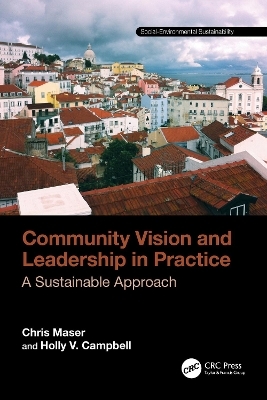
Community Vision and Leadership in Practice
CRC Press (Verlag)
978-1-032-40580-3 (ISBN)
This book is about building and maintaining involved, sustainable, and inclusive communities from the ground up during a period of unprecedented growth and global change. It explains the concepts and principles of community and sustainability and provides students with a framework of sustainable community planning to put into practice. It is also designed to help communities everywhere identify and reconnect the true essence of their ecological setting with the objective of raising their quality of life by increasing social, environmental, and economic sustainability.
Features:
Provides up-to-date frameworks for sustainable community planning processes and case studies on community planning
Explains tools for sustainable planning in accessible (non-specialist) language
Illustrates a roadmap to an inclusive, collaborative future
Explains aspects of sustainable community planning to maximize ecological ecosystem services and climate co-benefits simultaneously
Includes discussion questions and suggestions following each chapter
Intended for undergraduate and graduate students taking leadership and community courses with an emphasis on sustainable practices and ethics, as well as for citizens and professionals involved in community projects related to sustainability, the authors provide a forward-thinking approach, showing readers that they are capable of making a positive impact on the future of community development through sustainable approaches and ethical leadership practices.
Chris Maser has spent over 25 years as a research scientist in natural history and ecology. His experiences include international research studies in Egypt and Nepal and three-year (1970-1973) ecological survey of the Oregon Coast for the University of Puget Sound, Tacoma, Washington. He was a research ecologist with the U.S. Department of the Interior, Bureau of Land Management for thirteen years (1974 - 1987) and a landscape ecologist with the U.S. Environmental Protection Agency (1990-1991). Today he is an independent author as well as an international lecturer, facilitator in resolving environmental conflicts, vision statements, and sustainable community development. He is also an international consultant in forest ecology and sustainable forestry practices. He has written over 290 publications, including 47 books that he has either authored, co-authored, or edited. Holly V. Campbell holds a JD with certificates in ocean and coastal and environmental law from the University of Oregon, LLM in natural resource law from the Wallace Stegner Center at the University of Utah School of Law, and a PhD in environmental sciences from Oregon State University. Holly’s teaching spans Oregon State University, including her home department Fisheries, Wildlife, and Conservation Sciences (College of Agricultural Sciences), School of Public Policy (College of Liberal Arts), Marine Resource Management (College of Earth, Ocean, and Atmospheric Sciences), and the University Honors College, reflecting the interdisciplinarity of her work. She teaches courses in ecosystem services, wildlife law, energy policy, water and climate, marine policy, coastal and ocean law, innovation in cities, environmental science perspectives on the future of food, and others. Apart from her work in academics, she has also worked with world renowned environmental organizations such as the OECD, the US EPA, and the US FERC. Her work appears in peer-reviewed journal articles and book chapters.
1. Why Is a Shared Vision Important? 2. The Concept of Community 3. Questions We Need to Ask 4. Understanding A Vision, Goals, and Objectives 5. The Essence of Leadership 6. Coping With the Responsibilities and Pressures of Leadership 7. Negotiating Constraints to Community Visions 8. If You Want to Go Far, Go Together by Making Inclusive and Intelligent Decisions 9. Time, Change, and Resilience: The Theory and Practice of Community Sustainability
| Erscheinungsdatum | 02.08.2023 |
|---|---|
| Reihe/Serie | Social Environmental Sustainability |
| Verlagsort | London |
| Sprache | englisch |
| Maße | 156 x 234 mm |
| Gewicht | 320 g |
| Themenwelt | Naturwissenschaften ► Geowissenschaften ► Geografie / Kartografie |
| Technik ► Architektur | |
| Technik ► Umwelttechnik / Biotechnologie | |
| Wirtschaft | |
| ISBN-10 | 1-032-40580-5 / 1032405805 |
| ISBN-13 | 978-1-032-40580-3 / 9781032405803 |
| Zustand | Neuware |
| Informationen gemäß Produktsicherheitsverordnung (GPSR) | |
| Haben Sie eine Frage zum Produkt? |
aus dem Bereich


